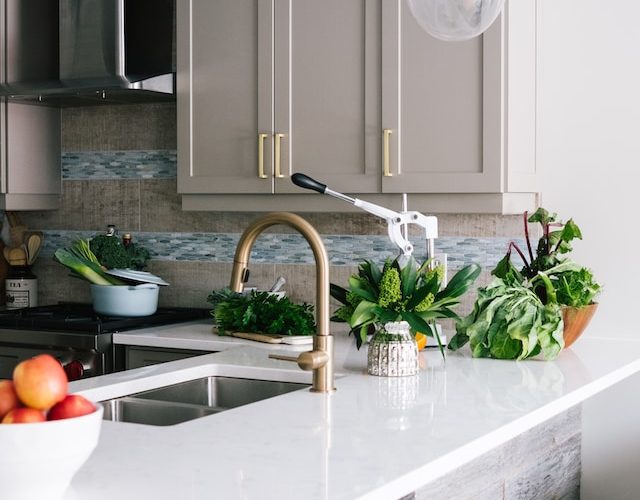Are you tired of buying expensive herbs from the grocery store that go bad within days? Why not start a kitchen garden and have fresh, fragrant herbs at your fingertips all year round! Not only will it save you money, but having a kitchen garden also comes with numerous health benefits and can add flavor to any dish. In this blog post, we’ll guide you through the process of starting your own kitchen garden, suggest some of the best herbs to grow and give tips on how to care for them so you can enjoy delicious meals straight from your very own garden!
What are the benefits of having fresh herbs at your fingertips?
Fresh herbs not only add flavor to any dish but they also come with numerous health benefits. One of the biggest advantages of having fresh herbs at your fingertips is that you can avoid using processed or pre-packaged herbs that often contain unhealthy additives and preservatives.
Another benefit is that it allows you to experiment with different flavors in your cooking, making every dish unique and personalized. By growing your own kitchen garden, you will have access to a wider variety of herbs than what’s usually available in stores, giving you endless possibilities for culinary creations.
Furthermore, studies have shown that some herbs such as basil and rosemary possess antioxidant properties which may help lower inflammation levels in the body. Additionally, incorporating fresh herbs into meals can help reduce sodium intake by adding flavor without relying on salt as much.
Having a kitchen garden has been proven to be therapeutic and stress-relieving. Taking care of plants can promote relaxation while connecting us with nature. All these benefits make starting a kitchen garden worth considering!
How to start a kitchen garden
Starting a kitchen garden can seem overwhelming, but it’s actually quite simple. The first step is to choose what herbs you want to grow. Consider what herbs you use most often in your cooking and start with those.
Next, decide where you want to plant your herbs. You can use pots or planters if you have limited space or don’t have access to an outdoor area. If you do have outdoor space, consider planting directly into the ground.
Make sure your chosen spot gets enough sunlight for the type of herb you’re growing. Most herbs need at least 6 hours of sunlight per day.
Once you’ve decided on the location, prepare the soil by loosening it up and removing any weeds or debris. If using pots or containers, fill them with high-quality potting soil.
When it comes time to actually plant your herbs, follow the instructions on the seed packet or transplant label carefully. Water regularly and keep an eye out for pests or disease.
Starting a kitchen garden doesn’t have to be complicated- just choose your herbs, pick a spot with adequate sunlight and good quality soil, then plant and care for them properly!
What are the best herbs to grow in a kitchen garden?
When it comes to choosing the best herbs for your kitchen garden, there are a few factors you should consider. Think about what you enjoy cooking and using in your meals on a regular basis. This will ensure that you get the most use out of your herbs.
One great herb to grow in a kitchen garden is basil. Not only does it taste great with pasta dishes and salads, but it’s also incredibly easy to care for. Similarly, parsley is another versatile herb that can be used in soups, stews or as a garnish.
If you’re looking for something with a bit more of a punchy flavour, try growing some chives or thyme. Both of these herbs have strong flavours that work well in savoury dishes like roasted vegetables or meats.
For those who love Mediterranean cuisine, oregano and rosemary are popular choices. Oregano pairs perfectly with tomato-based sauces while rosemary adds an earthiness to meat dishes and roast potatoes.
Mint is an excellent choice if you enjoy making cocktails or teas at home. It grows quickly and easily and can add freshness to any drink.
The best herbs for your kitchen garden depend on personal preference but these options are sure to elevate any dish!
How to care for your kitchen garden
Caring for your kitchen garden is essential to ensure the growth and health of your herbs. Here are some tips on how to care for your kitchen garden:
Watering: The first important aspect of caring for your herb garden is watering. Water them once a day, preferably in the morning, and make sure that the soil is moist but not waterlogged.
Sunlight: Herbs require sunlight to grow, so place them in an area where they can get at least 4-6 hours of sunlight daily. If you don’t have a spot with enough natural light, consider using artificial lights.
Pruning: Pruning helps keep your herbs bushy and healthy. Trim off any dead or yellow leaves as soon as possible to prevent diseases from spreading throughout the plant.
Fertilizing: Herbs need nutrients too! Fertilize monthly with an organic fertilizer or add compost directly into the potting mix.
Pest control: Keep an eye out for pests like aphids or spider mites. Regularly inspect plants and treat with insecticidal soap if necessary.
By following these simple steps, you’ll be able to enjoy fresh herbs right at your fingertips all year round!
Conclusion
Starting a kitchen garden can be a wonderful addition to your daily life, providing you with fresh herbs at your fingertips that can add so much flavor and nutrition to your meals. Not only that but caring for the plants in your garden can also bring you joy and relaxation as you watch them grow.
By following the steps outlined in this article, such as choosing the right location, selecting the best herbs to grow and taking good care of them, you will soon have a thriving kitchen garden that will enhance both your cooking skills and health.
So why not give it a try? You don’t need a lot of space or experience; all it takes is some patience, dedication and willingness to learn. Your taste buds -and body- will thank you for it!












